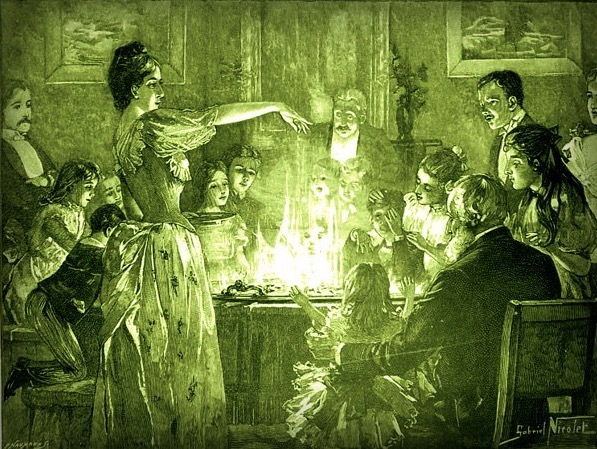Retro Rerun: A Tale of Two Centuries
Hebe wrote this article and a Part 2 for TGForum in 1998.
By Hebe Dotson
As the great odometer of time prepares to display three zeros, some of us feel irresistible urges to try to gaze a little farther into the future. I wouldn’t even think of trying to outguess the third millennium, but I have fewer qualms about considering the next 50-100 years of transgenderism.
To impose a little humility on the massive hubris that is such a natural part of long-range prophecy, imagine yourself in 1899, preparing to issue a fearless forecast for the twentieth century. You are, of course, a male: what woman of the 1890s would be considered (by males) to know enough of the world to have any credibility in predicting its future?
You have the knowledge, and technology is your strong suit. You begin your discourse with that rich man’s toy, the automobile. As anyone can see, it will soon become a popular means of transportation – improved manufacturing techniques will bring prices down, and millions of them will be in use by 1999. Powered flight? Many clever men are working on it, and eventually, before the new century is very far along, one or two of them will succeed. And once we get off the ground, even space flight – that interesting product of Jules Verne’s fertile imagination – is not beyond the realm of possibility.
Communications? We’ll have thousands of miles of paved highways to accommodate all those automobiles. We’ll have places where large aircraft can land to discharge their passengers and take on new riders to distant cities and countries. We’ll have telephones in every home and office. Men will soon find a way to transmit music – and even pictures – at first over wires and then through empty space.
“You’ve mentioned men a number of times,” your adoring spouse observes, “but what about women? What will our situation be?”
“Well,” you reply, “My crystal ball shows me millions of women in the work force by the end of the new century. They are not only teachers and clerks; they are also managers and executives, factory workers, scientists, newspaper reporters, professional athletes, elected officials – in brief, they can be found in almost any occupation you can imagine.”
“Elected officials? On school boards? Actually elected by men?”
“By men and women,” you respond. “Women will have the vote, and they will be elected as mayors, state legislators, governors, congressmen, and senators. They will serve on the Supreme Court and in the president’s cabinet. That’s in the United States, of course. In some other countries, women will be presidents and prime ministers.”
“Oh, my! And what will they be wearing?” your fashion-conscious spouse inquires.
“Let me see. Why, many of them will be wearing trousers, of all things – both at work and at home. And – holy Amelia Bloomer!”
“What’s the matter?”
“On the beaches – the public beaches! – women will wear almost enough cloth to make a collar for your blouse!”
What a visionary you are! No wonder, a few days later, you overhear your spouse confiding to her sister that your drinking problem has returned.
You swear off – no, not drinking; you swear off sharing your vision of the future with your unappreciative family. But then, a few days later, your cousin – a handsome, cultivated man of middle years who somehow has never managed to find the right woman – drops by your house. He understands that you’re quite the prognosticator. “And what do you see in the twentieth century,” he asks, “for men who – ah – prefer the manly company of other men?” You look at him curiously. “You – you know,” he stammers, “like – like that English fellow; what’s his name? Wilde? Will people like him get what’s coming to them?”
“In a manner of speaking, yes. Although they will still be stigmatized by many people, many others will accept them. Some, but by no means all, will emerge from the shadows to live and work as others do.”
“They won’t be thrown into prison?”
“No; at least not by the end of the century. Many of them will become prominent in their work – writers, artists, performers; congressmen even, and high-ranking government officials.”
“How do you know these things?” your cousin asks.
“They are obvious,” you reply, “to any keen observer of the times and trends.”
“I have a – friend,” he says. “Not quite as manly as most men – downright womanly, in fact. He’d like to – be a woman. If he could.”
You hesitate. Can it be possible that your cousin has been able to read your mind and divine your innermost, carefully-hidden desires? No; mental telepathy won’t be developed before 2062. You offer an encouraging murmur.
“What will the twentieth century mean for people like him?” your cousin asks.
“More than you’d believe. There will be astounding medical advances, making it possible to transform a man into a woman, at least as far as the eye can tell – or a woman into a man. Thousands of people will take advantage of these treatments, and thousands more will dress and live as members of their opposite biological sex with only partial medical transformations – or none at all. Moreover, the average American will become much more tolerant of people who differ from him in race, religion, and even sex – real or adopted. Not fully tolerant, mind you, but significantly more so than now.”
Your cousin leaves much happier than he came, and you’re happy, too – pleased with your newly-discovered prognosticational abilities. It’s so easy to predict the twentieth century – especially from a vantage point in the present.
To be serious, however, suppose that you really were an intelligent, well-informed observer in the late nineteenth century. Consider the state of the physical and biological sciences and their associated technologies in 1898. Consider the status of women, gays, and transgenders then, or even in 1948. How well could you predict the events, discoveries, and developments that have propelled us into the world of today?
Not all that well, I imagine. I’m sure I wouldn’t have even come close (that’s the humility). In Part 2, we’ll take a look at the 21st century (and that’s the hubris).
Category: Transgender History











